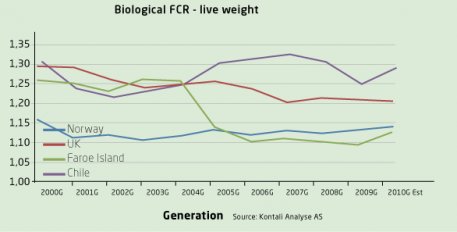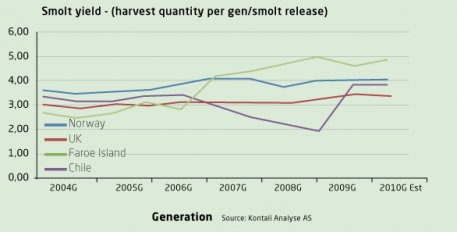Sustainability has become the hallmark of Faroese aquaculture.
The industry went through fundamental reform in 2003, and today the Faroe Islands has the most predictable fish production environment in the world.
In 2003, the Faroe Islands implemented one of the most comprehensive and stringent aquaculture veterinarian regulatory regimes in the world, known as the Faroese Veterinarian Act on Aquaculture. This legislation was enacted following requests from the industry for stringent legislation that would create a predictable and sustainable fish production environment.
The Faroese Veterinarian Act on Aquaculture is comprised of 81 paragraphs, all of which are designed to guarantee sustainability of the industry by protecting salmon from outbreaks of disease, by protecting the environment, and by ensuring fish welfare.
There are two regulatory agencies that have the responsibility of monitoring and enforcing the Faroese Veterinarian Act on Aquaculture:
- The Food and Veterinary Agency (Heilsufrøðiligastarvstova) – http://www.hfs.fo
- The Environment Agency (Umhvørvisstovan) – http://www.us.fo/
The Food and Veterinary Agency has the responsibility for all veterinarian matters, while the Environment Agency has responsibility for environmental matters. Producers are regularly inspected by both agencies.
The number of licenses for aquaculture in the Faroe Islands is strictly limited and regulated to ensure sustainability. The number and location of these licenses are based on extensive research and decades of experience. Licenses are located in selected fjords and sounds that effectively separate production areas and greatly improve area management and biological control.
Producers have to receive approval from both the Food and Veterinary Agency and the Environment Agency before commencing activities.
The Faroese Veterinarian Act on Aquaculture also stipulates the following:
- Mandatory vaccinations against infectious salmon anemia (ISA)
- Single generation single fjord strategy with mandatory fallowing for a minimum of two months between generations (all-in, all-out strategy) Click here to read more.
- Protocols and equipment which have to be in place on plants in order to avoid the spread of any potential disease
- All boats and trucks used for aquaculture have to be specifically designed for aquaculture transport and approved by the Food and Veterinary Agency
- Minimum distances between any aquaculture facilities
The industry's best biological results:
Thanks to ideal natural conditions, the Faroe Veterinarian Act on Aquaculture and a commitment to fish welfare and sustainability, the Faroese aquaculture industry has had the industry's best biological results in recent years.
The graph below shows that salmon from the Faroe Islands have the lowest biological feed conversion ratio (BFCR) of all major salmon producing countries. The BFCR is a measurement of how many kilos of feed it takes to produce one kilo of salmon. The BFCR is, therefore, a good indicator of sustainability:
The graph below demonstrates “smolt yields” for all major salmon producing countries. It shows that in recent years the Faroe Islands obtains the most out of each generation of salmon, which both reflects excellent fish welfare and the exceptionally low mortality rate amongst farmed salmon from the Faroe Islands:



